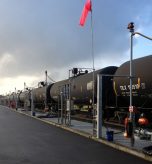Introduction
A leading private equity firm engaged our firm to conduct comprehensive due diligence on a potential investment in a short-line railroad and associated industrial park development. The client sought to understand the feasibility of pursuing an industrial park proximate to the short-line railroad compared to acquiring infill industrial land sites with no rail access. PraxiChain conducted an independent, objective analysis focused on assessing the target’s commercial situation, historical performance, and future prospects, with emphasis on critical end markets and technical asset review. The analysis also included a real estate feasibility study to determine economic and market conditions that would make the rail-served industrial facilities appealing to potential tenants.
At A Glance
Our team delivered a comprehensive market assessment and investment analysis for the private equity client considering the rail-served industrial development opportunity:
- Deep Supply Chain Expertise: The team leveraged its extensive knowledge of rail logistics, industrial real estate dynamics, and supply chain economics to provide comparative analysis of rail-served versus non-rail-served industrial properties.
- Competitive Intelligence: Detailed mapping and analysis of all competing rail parks in the region, including nearby rail-served industrial parks and facilities.
- Actionable Investment Framework: Data-driven evaluation of rental premiums, tenant requirements, and cost differentials to support go/no-go investment decision.
The Challenge
The private equity client needed to determine whether investing in the short-line railroad and developing an associated industrial park represented a sound investment opportunity compared to alternative industrial real estate strategies. This required deep understanding of multiple complex factors:
First, the client needed to evaluate the current state and future potential of the short-line railroad business, including customer base stability, commodity mix volatility, and growth opportunities. This required analyzing infrastructure, operations, and competitive position relative to other rail options in the region.
Second, the client needed to understand the value proposition for prospective industrial tenants that might locate on the property served by the railroad. This meant determining what types of tenants would benefit from rail access, quantifying potential demand, and evaluating rental rate differentials between rail-served and non-rail-served properties.
Finally, the client needed to assess supply dynamics in the regional market, including current industrial vacancy, competing developments, and the broader economic drivers that would support demand for industrial space in the coming years.
PraxiChain Solution
PraxiChain deployed a comprehensive two-workstream approach to address the client’s needs:
- Rail Real Estate Diligence: Defined tenant value proposition, identified economic drivers making the site appealing, evaluated cost differentials between rail/truck access options, quantified demand levels, analyzed rental premiums across markets, and assessed supply risks.
- Rail Short Line Diligence: Quantified business stability, assessed commodity and customer volatility, identified growth opportunities, analyzed competitive dynamics, measured cost differentials for regional fulfillment via rail vs. truck, and validated long-term viability of operating plan.
- Comprehensive Comparative Analysis: Benchmarked against competitive alternatives, conducted SWOT analysis, and provided detailed cost breakdown for different logistics scenarios.
Results
The team’s analysis delivered actionable, fact-based results that enabled the private equity client to make an informed investment decision. The comprehensive assessment provided:
A clear understanding of the competitive landscape and market positioning of the target railroad compared to other rail-served industrial parks in the region. This included detailed analysis of differentiating features such as dual rail service, liquid storage capabilities, and available land.
Quantifiable data on rental rate premiums for rail-served industrial properties in key regional markets, allowing the client to model potential returns and compare them to non-rail alternatives.
Detailed tenant requirement analysis categorizing potential users by their rail needs, helping the client understand which industries would be most likely to locate at the site and what specific infrastructure would be required to serve them.
Cost differential analysis comparing fulfillment options from the target site versus alternative locations, providing the client with concrete economic arguments to present to potential tenants.
The team delivered a robust investment framework through this comprehensive approach that highlighted both opportunities and risks, enabling the private equity client to proceed with confidence in their decision-making process.















